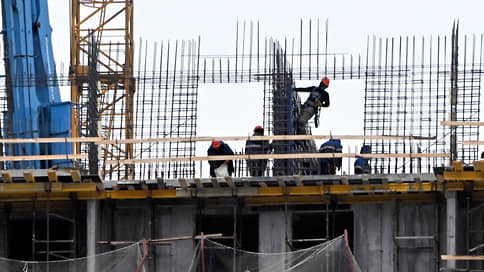Developers have mastered state construction
[ad_1]

In the first year after the outbreak of hostilities in Ukraine, the construction industry of the Russian Federation earned about 11.69 trillion rubles, almost 14% more than a year earlier. Growth was provided mainly due to budgetary injections into state-owned construction projects, while housing and commercial real estate developers reduced their cash receipts due to lower demand. However, already this year, financial risks will increase for the entire industry and the crisis will manifest itself more clearly, experts believe.
As follows from the Sherpa Group’s calculations provided by Kommersant, at the end of 2022, the total revenue of all companies in the construction industry, including state construction contractors, residential and commercial real estate developers, reached 11.69 trillion rubles, which is 13.9% more at current prices by the year. For comparison: over the past year, the total revenue in the real sector of the economy as a whole increased by an average of 8.7%.
The reason, in particular, is that “construction responds to crises with inertia,” explains Alexandra Galaktionova, general director of Sherpa Group. However, a certain slowdown is also observed here: last year, the growth rate of cash receipts in the construction industry was 13.2 percentage points lower than in 2021. Ms. Galaktionova says that the year before last, high rates were achieved due to the low base of 2020 – then less was built, since many projects were stopped at the height of the pandemic and the start of new ones was frozen.
Last year’s growth in the revenue of construction industry companies is largely due to the fact that during this period the construction of facilities launched a year earlier was going on, agrees the general director of Smart Engineers Hussein Pliyev. He notes that 2021 was one of the record years in terms of the number of investment projects launched for implementation in construction, this backlog greatly supported the sector in 2022.
The main factor that allowed the construction industry to show growth in the first year of the geopolitical crisis was an increase in budget investments in infrastructure construction, including within the framework of national projects, Alexandra Galaktionova believes. According to her, in 2022, 35% more funds were allocated from the federal budget for such projects than a year earlier. As a result, road and rail builders managed to increase revenue most noticeably — by 20-25% year-on-year, the expert adds.
Government construction contractors last year were also supported by the allocation of 156 billion rubles from the reserve fund of the budget of the Russian Federation. to cover previously incurred costs due to a sharp increase in building materials in 2021, says Maria Yarmalchuk, CEO of the National Association of Infrastructure Companies. In her opinion, for some companies that were on the verge of bankruptcy due to a sharp increase in costs, these compensations allowed them to stay afloat. However, according to Alexandra Galaktionova, an increase in the revenue of construction industry companies does not mean a proportional increase in profits, since they had to increase the costs associated with setting up new supply chains, import substitution of construction equipment and finding funds to cover cash gaps.
Meanwhile, in the commercial segment of the industry, things were not as good as in state construction. Thus, the total revenue of developers of the four major housing construction markets in the country — Moscow, the Moscow region, St. Petersburg and the Leningrad Region — decreased by 17% in 2022, to 2.06 trillion rubles. (see Kommersant dated February 9). The revenue of developers of offices and warehouses also fell seriously due to a reduction in demand for such facilities, said Dmitry Panov, coordinator of Business Russia for the North-Western Federal District.
Forecasts for 2023 from market participants are pessimistic. According to Ms. Galaktionova, the risks to the financial stability of all companies in the sector will only grow. Hussein Pliev expects this year the bankruptcy of medium and large general contractors, who signed long-term contracts with a fixed price before the crisis and cannot cope with the volatility of prices for materials and equipment. Considering the long construction cycles, the expert concludes, the serious impact of the crisis on the industry will be felt already this year.
[ad_2]
Source link





